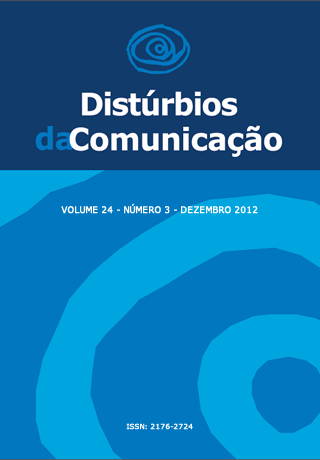Activities of interactive teleducation in vocal health based on the young doctor dynamics
Keywords:
voice, voice disorders, education, distance, information technologies and communication projects, telemedicine.Abstract
Introduction: activities of vocal health promotion must reach the young, adult and elderly populations due to risks that everyone presents in the development of Dysphonia. In this purpose, the Young Doctor Project proposes dynamics of training to turn adolescents capable of disseminating, to the community, knowledge about health themes. Objective: to create and evaluate the content of a Cybertutor, composing a training program about vocal health, following the Young Doctor proposal. Methods: the cybertutor on vocal health was developed from the scientifi c literature. Subsequently, was evaluated by the Flesch Reading Facility Index (FRFI) and by 14 students of high school of two different schools. Those students participated of a training program, consisting in two classroom lectures, cybertutor access and workshop. Results: the modules obtained overall average of 56.68% (sd±8,15) of the FRFI featured as Standard level. Concerning the subjective assessment, 89.61% of students classifi ed the cybertutor quality as excellent/ satisfactory, regarding that the items “fi gures quality” and “content organization” were classifi ed as excellent/satisfactory in 100% of sample. In the end of the activities, the students received a white coat and a certifi cate were, named Young Doctors, disseminating the acquired knowledge to 1300 community people. Conclusion: the creation and evaluation of the cybertutor on vocal health expressed language in the Standard level and high satisfaction of students. The program enabled the communication of information about vocal health to an expressive number of community people by the intense action of the “Young Doctors”.Downloads
Metrics
Downloads
Published
Issue
Section
License
Copyright (c) 2012 Camila de C. Corrêa, Aline Martins, Cássia de S. Pardo-Fanton, Andressa S.C. da Silva, Guilherme T. T. Barros, Chao L. Wen, Luciana P. Maximino, Giédre Berretin-Felix, Wanderléia Q. Blasca, Alcione G. Brasolotto

This work is licensed under a Creative Commons Attribution 4.0 International License.









